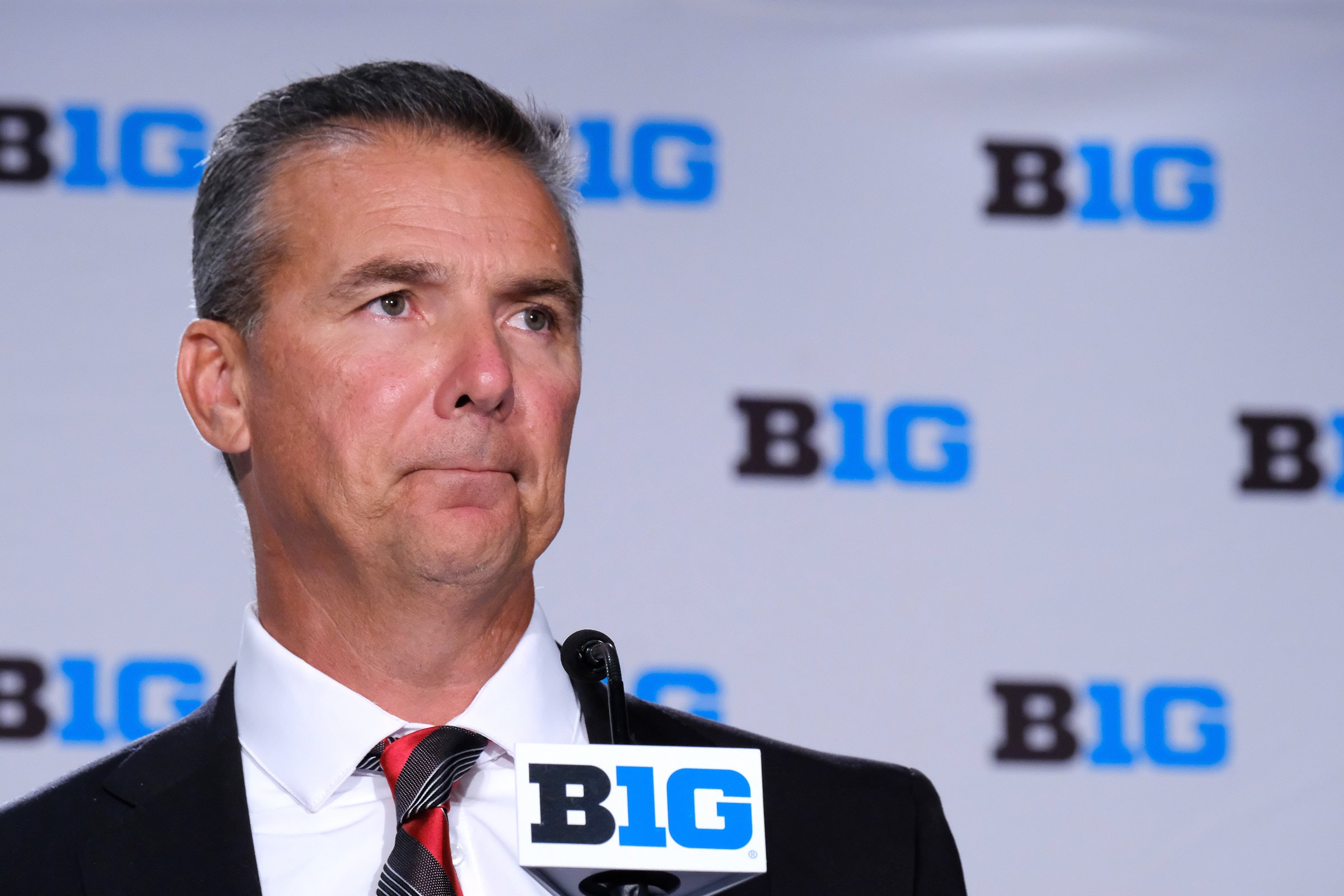
College coaches and athletes have faced more severe punishments than the three-game suspension Ohio State handed its head football coach, Urban Meyer, on Wednesday evening. For less serious offenses. Tennessee once fired basketball coach Bruce Pearl for lying to investigators about hosting recruits at a cookout, since such niceties are NCAA violations. This month, nine football players from the University of North Carolina, which like all major college programs does not pay its football players a market wage despite the millions of dollars those players deliver their school, were suspended for four games for selling team-issued shoes.
But Meyer got just three games, even though an independent investigation led by former prosecutor and Securities and Exchange Commission chair Mary Jo White found that the Ohio State coach failed to properly handle domestic violence allegations against a former assistant coach.
Meyer also told a whopper of a lie to the public on June 24, when he said at Big Ten media day that he was unaware of 2015 domestic accusations against assistant coach Zach Smith, made by his ex-wife Courtney Smith. Meyer later apologized “for the way I handled those questions” at the media event, insisting that he “was not adequately prepared to discuss these sensitive personnel issues with the media.”
At a press conference at Ohio State Wednesday night, White said that while Meyer’s denials about his knowledge of the 2015 domestic violence allegations against Smith “were plainly not accurate, Coach Meyer did not, in our view, deliberately lie.”
Put aside, if you wish, the believability of Meyer accidentally fibbing about a serious, straightforward issue: his knowledge of domestic violence allegations against one of his coaches. (White’s report itself says “we cannot logically square Coach Meyer’s responses on Big Ten Media Days broadly denying knowledge of the 2015 events regarding Zach Smith with his extensive knowledge of those events in 2015,” but then goes on to note that Meyer “sometimes has significant memory issues” and “has also periodically taken medicine that can negatively impact his memory, concentration, and focus”).
All in all, Meyer got off pretty easy. He did not lose his job. Sure, after missing games against Oregon State and perennial Big Ten weak link Rutgers — both of which Ohio State should win — Meyer will have to sit out Ohio State’s game against No. 16-ranked Texas Christian University in Arlington, Texas. Still, he’ll coach the bulk of the season. He’s missing just one Big Ten conference game. He can even run practice before the Rutgers and TCU games. He can coach against arch-rival Michigan on Nov. 24.
But in watching Wednesday night’s press conference in Columbus, Ohio, after Ohio State President Michael V. Drake announced Meyer’s suspension (and the suspension of Ohio State athletic director Gene Smith from Aug. 31-Sept. 16 for management failure), you never would have known that Meyer got a slap on the wrist. His body language, and responses to reporters’ questions, sent a message that he felt he was the aggrieved party.
He rushed through reading a pre-written statement, robotically going through the motions. He sometimes asked reporters to repeat their questions, as if he couldn’t be bothered to pay attention. Meyer often appeared disengaged. When a reporter asked Meyer if he agreed with Drake’s decision to suspended him, Meyer pointedly didn’t say “yes.” Instead, he replied “I trust and support our president.” He clearly doesn’t believe he should have been suspended. Meyer believes he followed the proper internal reporting protocols about Smith’s behavior.
“I’m fully aware that I’m ultimately responsible for the situation that has harmed the university as a whole and our university athletics program. I followed my heart, not my head,” Meyer said at the press conference. “I should have done more, and I am sorry for that.”
None of Ohio State leaders at the press conference — Drake, Gene Smith, and Meyer — offered direct words to Courtney Smith, who shared text messages with college football reporter Brett McMurphy showing bruises and her 2015 communication with Meyer’s wife, Shelly Meyer, alerting her to the alleged abuse. (Zach Smith has denied the accusations of domestic violence). At the end of the press conference, a journalist gave Meyer an opening. “What message do you have for Courtney Smith?” he asked.
His reply was strikingly impersonal. “Well, I have a message for everyone involved in this,” Meyer said. “I’m sorry we’re in this situation.” He stared blankly at the reporter for a beat. “I’m just sorry we’re in this situation.”
More Must-Reads From TIME
- The 100 Most Influential People of 2024
- The Revolution of Yulia Navalnaya
- 6 Compliments That Land Every Time
- What's the Deal With the Bitcoin Halving?
- If You're Dating Right Now , You're Brave: Column
- The AI That Could Heal a Divided Internet
- Fallout Is a Brilliant Model for the Future of Video Game Adaptations
- Want Weekly Recs on What to Watch, Read, and More? Sign Up for Worth Your Time
Write to Sean Gregory at sean.gregory@time.com